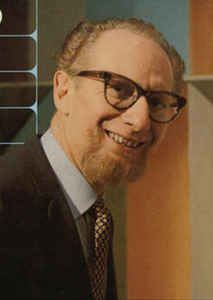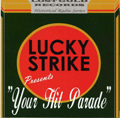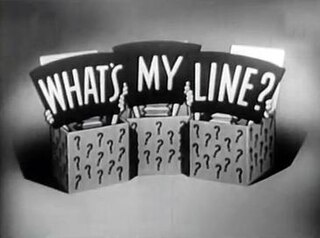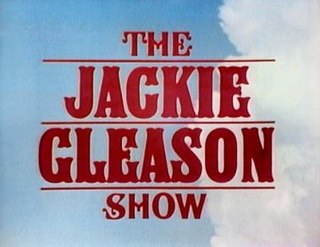Related Research Articles
CBS Broadcasting Inc., commonly shortened to CBS, is an American commercial broadcast television and radio network serving as the flagship property of the CBS Entertainment Group division of Paramount Global and is one of the company's three flagship subsidiaries, along with namesake Paramount Pictures and MTV.
The year 1955 in television involved some significant events. Below is a list of television-related events during 1955.
The year 1950 in television involved some significant events. Below is a list of television-related events during 1950.

Milton Delugg was an American musician, composer and arranger.

Your Hit Parade was an American radio and television music program that was broadcast from 1935 to 1953 on radio, and seen from 1950 to 1959 on television. It was sponsored by American Tobacco's Lucky Strike cigarettes. During its 24-year run, the show had 19 orchestra leaders and 52 singers or groups.

Duffy's Tavern is an American radio sitcom that ran for a decade on several networks, concluding with the December 28, 1951, broadcast.

What's My Line? is a panel game show that originally ran in the United States, between 1950 and 1967, on CBS. The game show started in black and white and later in color, with subsequent U.S. revivals. The game uses celebrity panelists to question contestants in order to determine their occupation. The majority of the contestants were from the general public, but there was one weekly celebrity "mystery guest" for whom the panelists were blindfolded. It is on the list of longest-running U.S. primetime network television game-shows. Originally moderated by John Charles Daly and most frequently with regular panelists Dorothy Kilgallen, Arlene Francis, and Bennett Cerf, What's My Line? won three Emmy Awards for "Best Quiz or Audience Participation Show" in 1952, 1953, and 1958 and the Golden Globe Awards for Best TV Show in 1962.

The Jackie Gleason Show is the name of a series of American network television shows that starred Jackie Gleason, which ran from 1952 to 1970, in various forms.
James Edward Burrows, sometimes known as Jim "Jimmy" Burrows, is an American television director. Burrows has received numerous accolades including 11 Primetime Emmy Awards and five Directors Guild of America Awards. He was honored with the Directors Guild of America Lifetime Achievement Award in 2015 and NBC special Must See TV: An All-Star Tribute to James Burrows in 2016.

Abe Burrows was an American humorist, author, and director for radio and the stage. He won a Tony Award and was selected for two Pulitzer Prizes, only one of which was awarded.
Hear It Now, an American radio program on CBS, began on December 15, 1950, ending in June 1951. It was hosted by Edward R. Murrow and produced by Murrow and Fred W. Friendly. It ran for one hour on Fridays at 9 pm Eastern Time.
The following is the 1950–51 network television schedule for the four major English language commercial broadcast networks in the United States. The schedule covers primetime hours from September 1950 through March 1951. The schedule is followed by a list per network of returning series, new series, and series cancelled after the 1949–50 season. This season became the first in which primetime was entirely covered by the networks. It was also the inaugural season of the Nielsen rating system. Late in the season, the coast-to-coast link was in service.

The Paramount Television Network, Inc. was a venture by American film corporation Paramount Pictures to organize a television network in the late 1940s. The company-built television stations KTLA in Los Angeles and WBKB in Chicago; it also invested $400,000 in the DuMont Television Network, which operated stations WABD in New York City, WTTG in Washington, D.C., and WDTV in Pittsburgh. Escalating disputes between Paramount and DuMont concerning breaches of contract, company control, and network competition erupted regularly between 1940 and 1956, culminating in the DuMont Network's dismantling. Television historian Timothy White called the clash between the two companies "one of the most unfortunate and dramatic episodes in the early history of the television industry."
Actors Studio is an American television series that was hosted by Marc Connelly. It originally aired on ABC from September 26, 1948 to October 26, 1949 and then on CBS from November 1, 1949, to June 23, 1950. It was one of the first series to be picked up by a network after being cancelled by another network. CBS departed from its own precedent when it took the World Video-owned series. Until then it had not shown any sustaining programs that were not owned by CBS.
The Ed Wynn Show is an American variety show originally broadcast from September 22, 1949 to July 4, 1950, on the CBS Television Network. Comedian and former vaudevillian Ed Wynn was the star of the program's 39 episodes, which were the first shows broadcast live from Hollywood, and transmitted via kinescope to New York.
Faye Emerson's Wonderful Town, also known as Wonderful Town, USA, is a half-hour variety television series that aired on CBS from June 16, 1951, to April 19, 1952, in which Faye Emerson visits various cities. Episodes of the program were also shown to American military personnel overseas via Kinescope.

The Bing Crosby Show for Chesterfield was a 30-minute musical variety old-time radio program starring entertainer Bing Crosby. The series ran on CBS Radio from 1949–1952.
This Is Show Business is an American variety television program that was broadcast first on CBS and later on NBC beginning July 15, 1949, and ending September 11, 1956. It was CBS-TV's first regular series broadcast live from coast to coast. It was originally titled This Is Broadway.
We Take Your Word is an American radio program that was broadcast on CBS beginning January 29, 1950. It was also adapted into a television version.
References
- 1 2 Brooks, Tim; Marsh, Earle F. (2009). The Complete Directory to Prime Time Network and Cable TV Shows, 1946–Present. Random House Publishing Group. p. 9. ISBN 9780307483201 . Retrieved 9 August 2017.
- ↑ Terrace, Vincent (2009). Encyclopedia of Television Shows, 1925 through 2007 (Volume 1). Jefferson, North Carolina: McFarland & Company, Inc. ISBN 978-0-7864-3305-6.